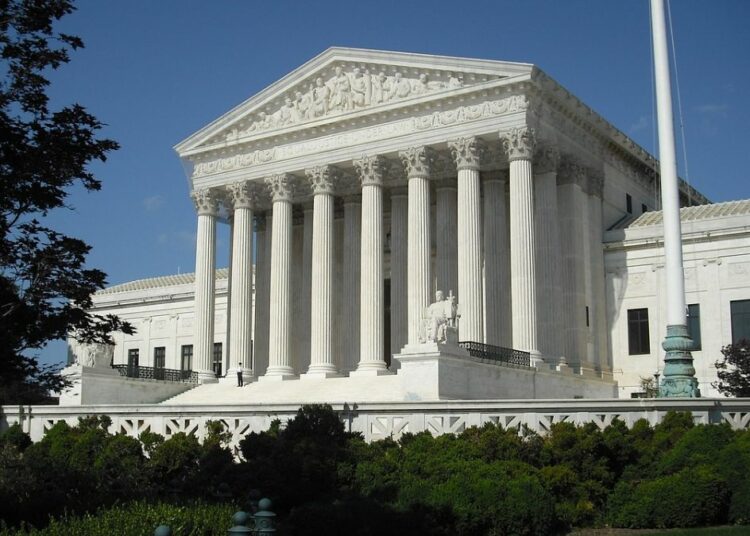[This article originally appeared in SALVO (www.salvomag.com) on June 30, 2020; it is reproduced here with permission. – Ed.]
On Monday of this week, the U.S. Supreme Court struck down yet another state attempt at regulating the abortion industry—this time, in Louisiana.
The case, June Medical Services LLC v. Russo, dealt with a Louisiana state law requiring that abortion providers have admitting privileges at a nearby hospital. The court determined that the case was in every respect almost identical to the 2016 Whole Woman’s Health v. Hellerstedt, a 2016 decision striking down a Texas law requiring admitting privileges, and thus required the same answer.
The dissenting Justices—Thomas, Alito, Gursuch, and Kavanaugh—all pointed out some similar problems with this decision. First, as Justice Thomas strongly argues, the abortionists who brought this case before the Supreme Court had no right to do so—and thus this case should never have been heard. At issue here is the idea of “third-party standing,” the idea that a third party (in this case, abortion providers) can argue on behalf of others. As Roberts argues, “[The abortionists’] sole claim before this Court is that Louisiana’s law violates the purported substantive due process right of a woman to abort her unborn child. But they concede that this right does not belong to them, and they seek to vindicate no private rights of their own.” Or, as Justice Alito puts it, “the idea that a regulated party can invoke the right of a third party for the purpose of attacking legislation enacted to protect the third party is stunning.”
But also at issue here is the dubious and contested term, “women’s health.” One line of argument used in this case and others is that admitting privileges are simply not necessary to maintain proper healthcare standards. This, the dissenting justices argue, is untrue in a number of ways. Boards granting admitting privileges take a long, hard look at doctors’ performance. As Justice Alito writes, “The record shows that the vetting conducted by hospitals goes far beyond what is done at Louisiana abortion clinics.” Take, for example, June Medical, the facility that brought the original suit. June Medical requires nothing more than the possession of a medical license to perform an abortion, and Alito writes that “Doe 3, the only person at that clinic who evaluates applicants, testified that he does not perform background checks of any kind, not even criminal records checks.” The clinic has previously even hired an ophthalmologist and radiologist to perform abortions. Other abortion facilities in the state had similar lax procedures for examining practitioners’ backgrounds before hiring, leading Alito to conclude that it is not surprising that the Louisiana Department of Health had issued “Statements of Deficiency” against these abortion facilities for failing to establish proper credentialing procedures, and failing to adequately examine physicians’ backgrounds or possible claims of malpractice against them.
Justice Gorsuch offered similar, compelling reasons for the admitting privileges requirement. Gorsuch summarizes testimony to the inherent risk of abortion procedures, including perforated uterus, hemorrhage, cervical laceration, left-behind fetal body parts, and more. These risks, he continues, are minimized when the doctors performing the abortion are “competent.” But “Louisiana’s abortion clinics historically have done little to ensure provider competence.” The Court also heard testimony as to some of the ways that Louisiana’s abortion facilities have done anything but maintain environments and standards to safeguard women’s health, including the failure to maintain sterile environments and failure to check patients’ vital signs. “One clinic,” Gorsuch writes, “used single-use hoses and tubes on multiple patients, and the solution needed to sterilize instruments was changed so infrequently that it often had pieces of tissue floating in it. Hospital credentialing processes, witnesses suggested, could help prevent such violations.” Gorsuch also related witness testimony, including that of one woman who, when hemorrhaging, was told by her abortionist “You’re on your own. Get out.” The woman later visited an emergency room, where a physician removed fetal body parts that the abortionist had missed. Another woman, complaining of severe pain following her abortion, was told to go home and lie down. She visited an ER instead, where the physicians found a large hematoma containing a fetal head. These are but two of a long list of horror stories.
When the abortion providers of June Medical Services brought this suit against Louisiana, they were not concerned for the health of their patients. If they were, they may have attempted, instead, to first try to curb some of the incidents that brought about numerous citations. They could have also sought to fulfill the law’s requirements. But instead, “as the U.S. Court of Appeals for the 5th Circuit found, Louisiana’s abortion doctors did not bother to make a good-faith attempt to obtain admitting privileges. Instead, they ‘largely sat on their hands,’ not even trying to see if they could satisfy the law’s requirements for their patients’ wellbeing.”[1]
One might suggest that it was the state of Louisiana, and not the Supreme Court or the abortionists, who had the interests of women at heart. It was the state that was best positioned to understand the infractions of the handful of clinics in its borders.
What worried these doctors was not the health of their patients, but rather the ways in which this state requirement would hinder their well-oiled money-making machine. Women’s health was the last thing on their mind.
[1] Denise Harle, “Symposium: A long-awaited opportunity to close the loophole on third-party standing,” SCOTUS blog (January 29, 2020), available at https://scotusblog.com/2020/01/symposium-a-long-awaited-opportunity-to-close-the-loophole-on-third-party-standing/.




















Discussion about this post